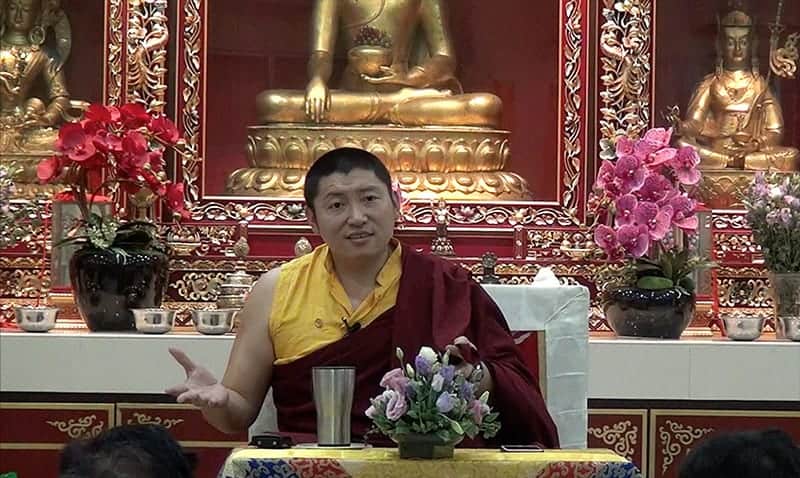Learning Meditation: A Way of Thinking, Behaving, and Living
Learning meditation should bring us benefits. If we don’t see any results, then why would we bother to spend time going to courses or retreats? The point of meditation is not simply to be calm. We could probably find a sense of calm just by sitting quietly in nature. Instead, in this video teaching, Phakchok Rinpoche reminds us that the point of meditation is to change!
This teaching, from a public talk in Malaysia, is in English and translated into Chinese.
Often, people come to meditation courses thinking they need to learn how to sit in a particular posture. And, of course, posture is important: it helps our minds to settle. But meditation is about so much more. Meditation is a whole package. It affects how we think, how we behave, and how we live our lives. And meditation involves our mind. So, it is really important that we think about what we mean by the mind.
Learning Meditation: What is Mind?

Rinpoche observes that we all have different aspects of our minds. He uses specific terminology to help us understand these aspects.
In this talk, he focuses on two aspects of the mind. Rinpoche speaks of one as basic mind and the other as habit mind.
Basic Mind
Basic mind is the mind that is neither angry nor happy. It is simply a neutral mind that is aware. When we hear “basic mind,” we need to think about our own mind. How is it? When we hear about basic mind, we can look internally. Make it real, make it relevant! Consider, “this morning, when I woke up, how was my mind?”
Habit Mind
We need to see which of our habits disturb either ourselves or others. Using mindfulness, we can learn to spot our own bad habits. Some of us have very short tempers, others may complain a lot, or we may take things very personally.
As an example, most of us feel that something is missing — something is just not quite right. We look at the glass as half-empty, and we complain a lot. This is something we can all admit. And we complain to ourselves and to other people. If you look carefully, this is just a habit, right? But, we think that this feeling of unhappiness is just natural to us. And yet, if we examine, we can see how our habit of complaining leads to comparison, jealousy, competitiveness, and unhappiness. And it is all not solid, but just a habit. Unfortunately, most of us allow habit mind to take over.
How Do We Learn?
The way we learn about the mind is extremely important. If we listen to teachings but don’t really reflect inwardly and relate what we hear to our own minds, we won’t get much benefit. And, if we just take notes and think it all applies to everybody else, then it really won’t bring any results. And we do want to see changes. Aren’t we meditating in order to transform?
Two Ways of Learning: Using Mindfulness
Rinpoche explains that we learn best if we apply two techniques alternatively.
First, we learn by watching our own behavior in daily activities. We use mindfulness to watch our own actions. In this technique, we learn by simply observing. We become aware of how we react and how our own minds work. But we’re not keeping score, or judging ourselves in any way. Instead, we are observing as if we are scientists monitoring unusual subjects.
Secondly, we sit in meditation and watch how our mind flits about. Both of these processes teach us a lot.
No Boredom
Knowing about basic mind and habit mind means we will not get bored with our practice. Instead, we develop a playful curiosity. We begin to understand our minds and we see that we are improving! Becoming bored is not a real problem for practitioners.
However, if we practice and see no transformation, then that would be a big problem. That means we haven’t learned how to practice correctly. We haven’t learned to be aware of our habits. Instead, we get caught up in the techniques. Simply keep coming back to investigating basic mind and habit mind.
Learning Meditation: Reflection Exercise and Question
Take some time to look at your habit mind. Can you see the shift from the neutral, basic mind to habit mind? How does this occur for you?
During this week, choose one habit that you wish to change. Notice when that habit starts to dominate your thinking and actions. Don’t judge yourself harshly, but be mindful.
Throughout your day, see if you can gently tell that habit that you are not going to pay attention to it. Do this kindly, but firmly. Instead of slipping into the comfortable habit, can you allow yourself to see things differently?
After a week of practicing this, what have you noticed? And did any other habits start to show themselves? What did you learn by applying mindfulness in this way?










Responses